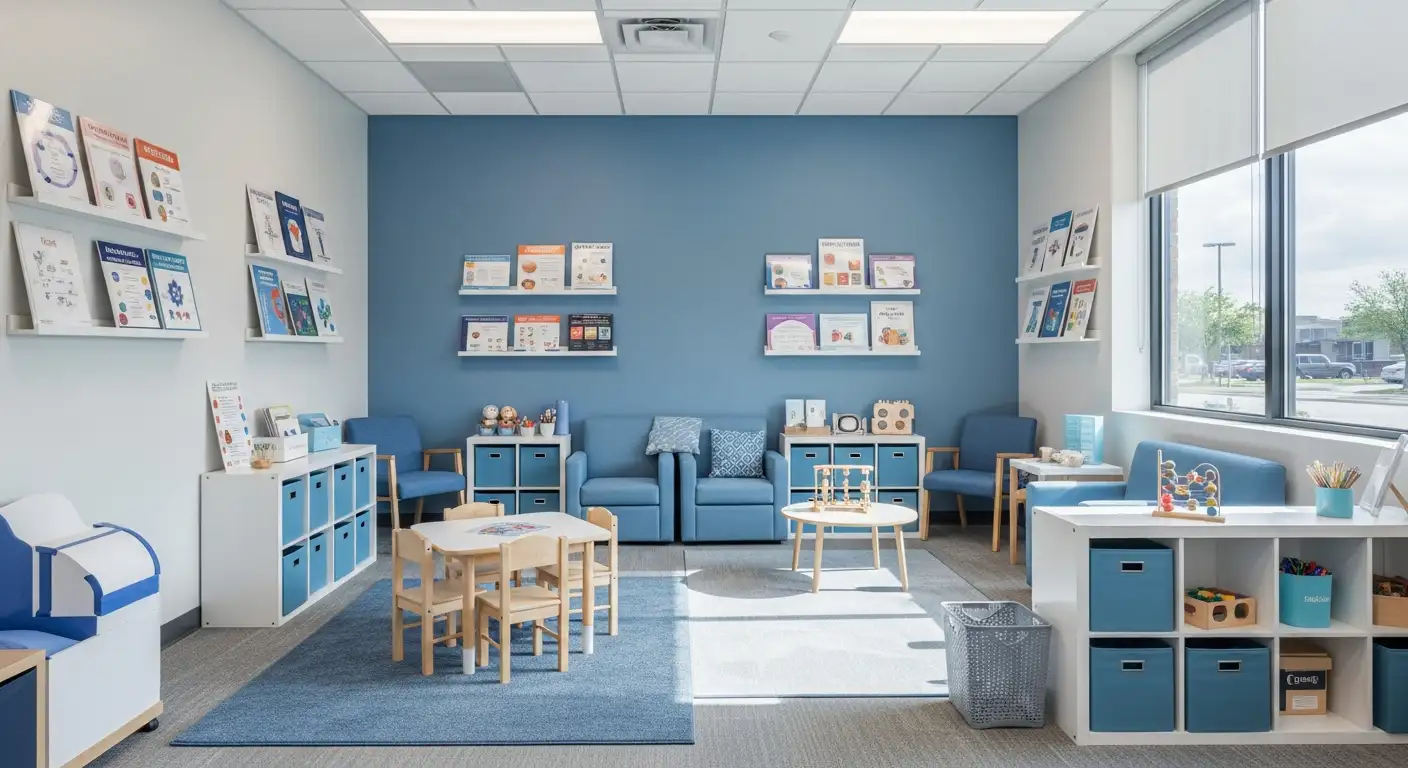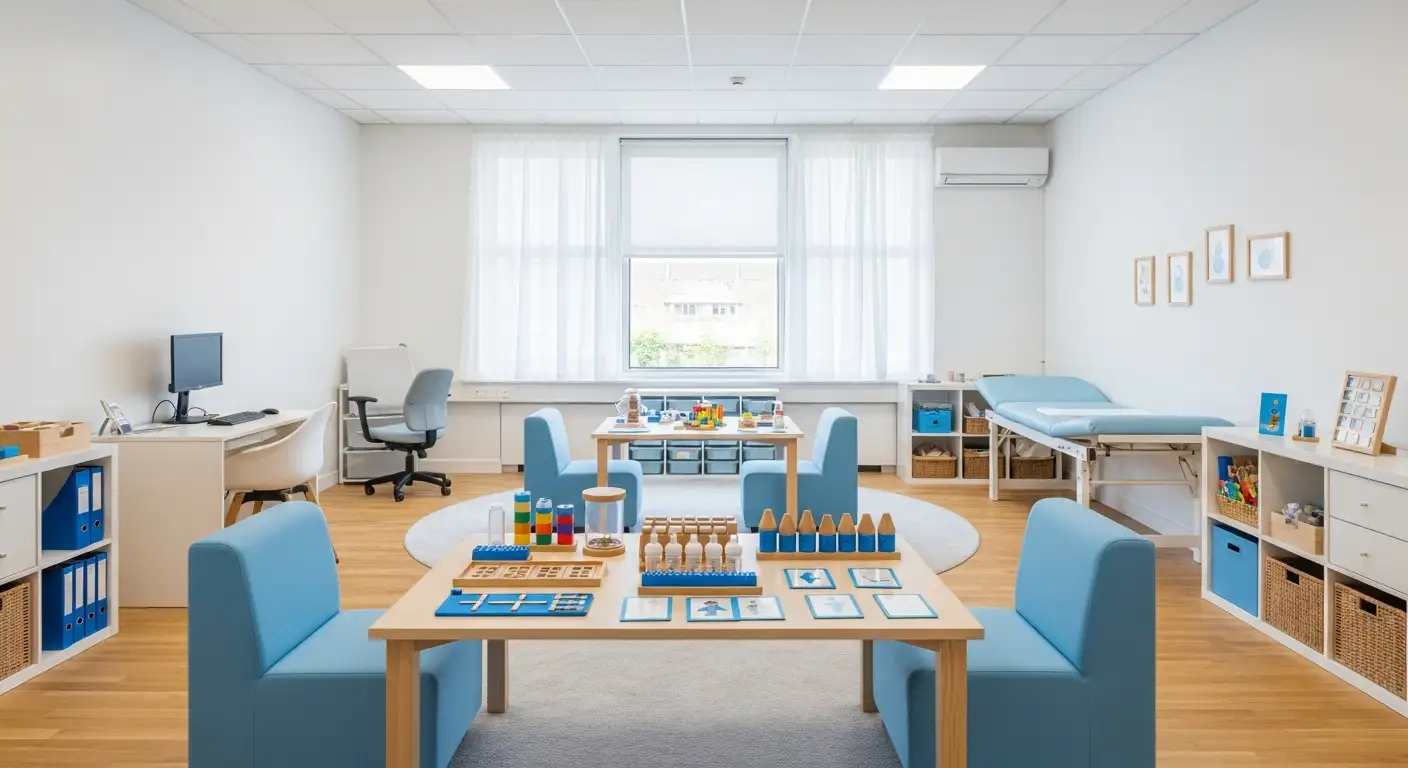Setting the Stage for a Successful Transition
Preparing teens with autism for college life is a multi-faceted process that involves early planning, skill development, and strategic support. This article explores essential strategies and evidence-based programs designed to promote independence and success for autistic students as they move into higher education and adulthood.
Early Transition Planning: Laying the Foundation for Independence
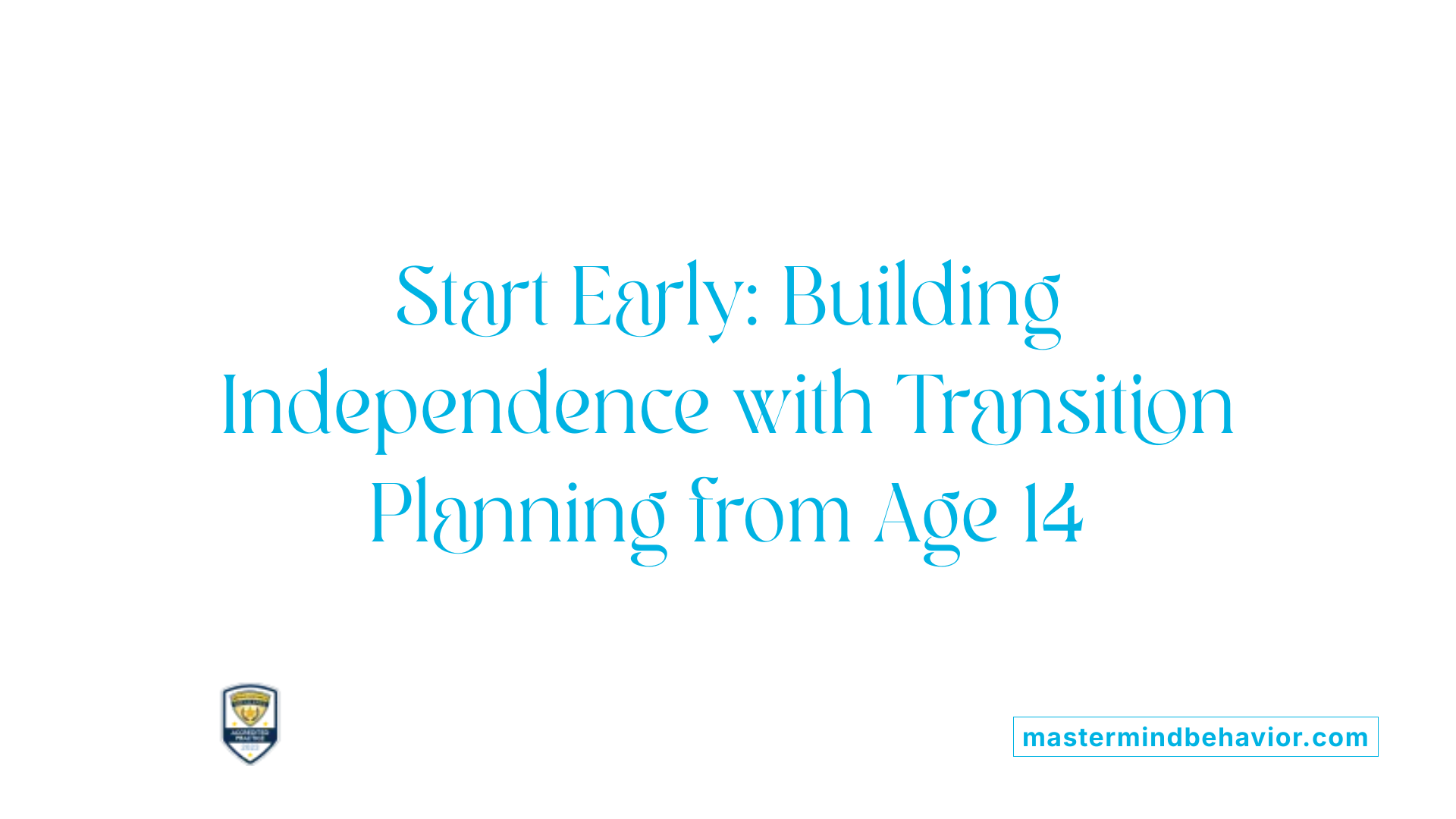
Why Should Transition Planning Start by Age 14?
Beginning transition planning early, ideally by age 14, is critical to help teens with autism prepare for the shift to independence and college life. This early start allows time to build essential skills gradually and to navigate the complexities of moving from high school to postsecondary education with support tailored to their unique needs.
Who Should Be Involved in Transition Planning?
Successful transition planning relies on collaboration among multiple stakeholders, including the student, parents, school counselors, teachers, and other support personnel. By working together, these individuals can create a coordinated plan that addresses academic, social, and independent living goals, ensuring the student is fully supported throughout the process.
What Are the Main Goals of Early Transition Planning?
The goals focus on fostering independence and college readiness. This includes developing skills such as self-advocacy, executive functioning, time management, and emotional regulation. Planning also emphasizes familiarizing students with accommodations and support services they'll need in college, so they can confidently request and use these resources. Overall, early planning sets a strong foundation to ease the transition and boost success in higher education settings.
Supporting Executive Functioning and Daily Routines in College
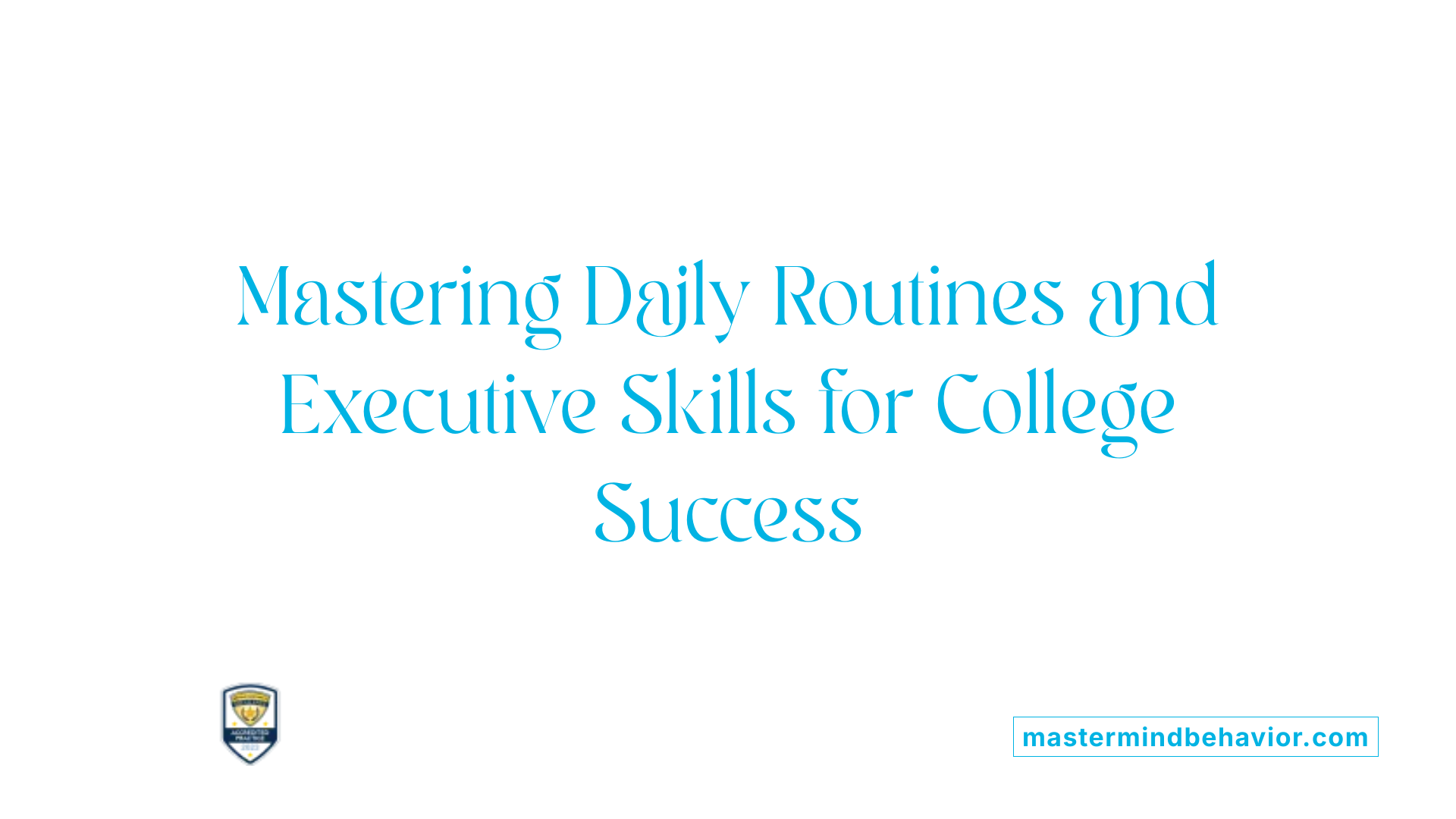
What Challenges Do Autistic Students Face with Executive Functioning?
Many students on the autism spectrum encounter difficulties with executive functioning, which is the set of mental skills needed to manage time, organize tasks, and handle independent living activities. These challenges often affect their ability to plan, initiate work, and maintain routines in a college setting where structured support may be less available than in high school.
How Can Organizational Tools Help?
To support college success, autistic students benefit from practical organizational strategies. Using visual schedules, planners, alarm clocks, and flow charts provides clear, accessible cues that help in managing daily tasks and deadlines. These tools aid in structuring time and breaking down complex activities, reducing anxiety about managing multiple responsibilities independently.
What Strategies Manage Overwhelm and Support Daily Routines?
Managing sensory sensitivities and emotional regulation is crucial. Strategies such as developing an "emotional toolkit," which might include sensory tools, meditation, journaling, and mindfulness exercises, empower students to cope with stress and prevent overwhelm. Additionally, teaching executive functioning skills like self-checking work, planning ahead, and prioritizing tasks supports smoother transitions through daily routines.
By combining organizational aids with emotion regulation practices and targeted executive function training, colleges can help autistic students thrive both academically and personally.
The Critical Role of Self-Advocacy Skills in Postsecondary Education
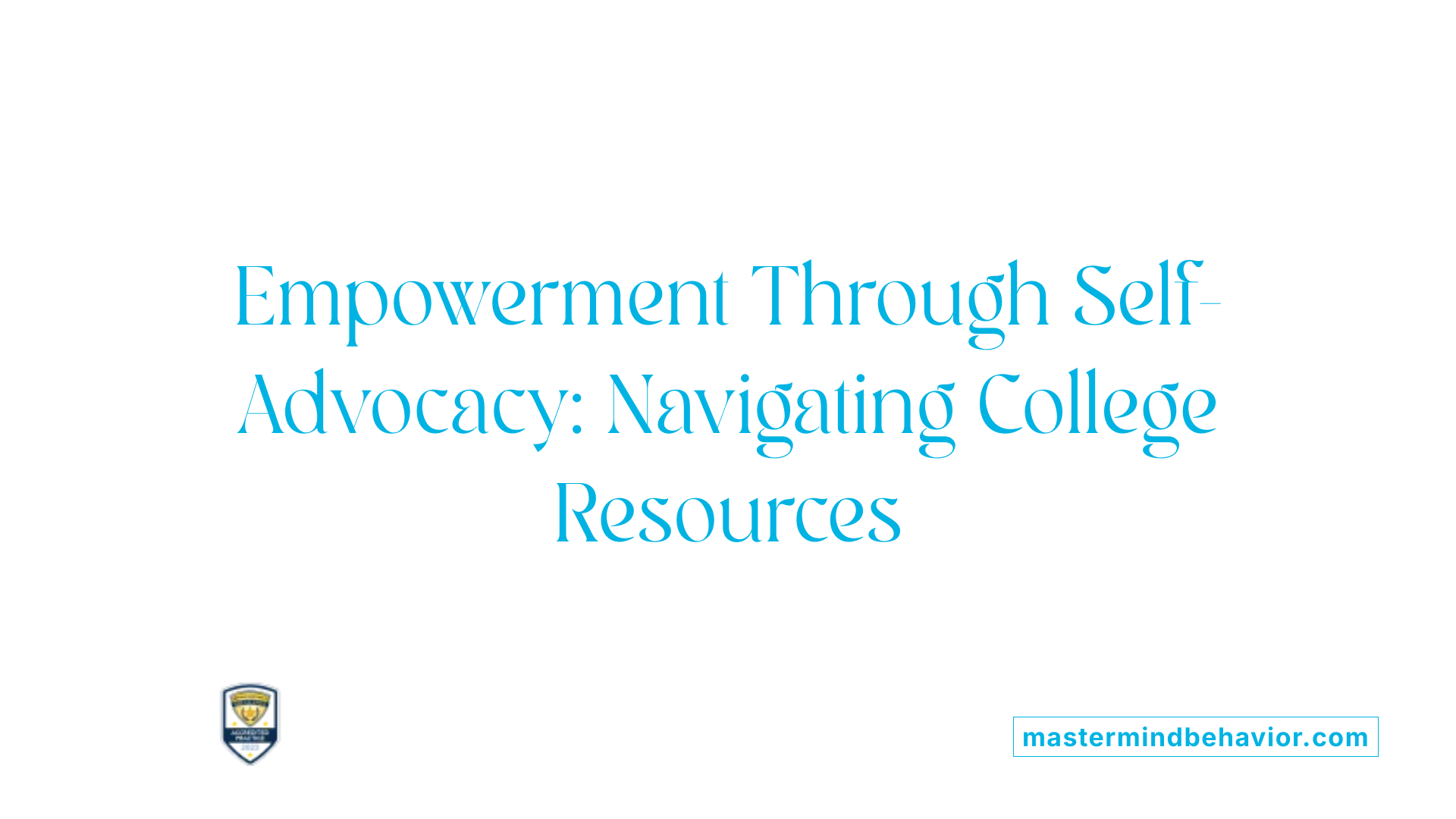
Teaching self-advocacy and communication of needs
For teenagers with autism entering college, learning to advocate for themselves is essential. This means understanding one’s own needs and effectively communicating them to professors, advisors, and peers. Building self-advocacy skills enables students to express what support or modifications will help them thrive academically and socially in college environments.
Requesting accommodations and negotiating support
A significant part of self-advocacy is knowing how and when to request accommodations. Autistic students benefit from proactively disclosing their diagnosis to the college’s disability office, providing necessary documentation, and working collaboratively to access services such as extended test time, note-taking assistance, or quiet spaces. Negotiating these supports is a skill that can increase students’ independence and confidence.
Resources like handbooks created by autistic adults
To support this learning, resources that are designed by autistic adults themselves offer invaluable guidance. Handbooks focused on self-advocacy help students navigate college settings by sharing real-world strategies and perspectives. These materials provide practical advice on understanding legal rights, communicating effectively, and building resilience necessary for postsecondary success.
Together, these elements of self-advocacy training empower autistic college students to manage their educational experience and promote long-term independence.
Proactively Navigating College Disability Services and Accommodations
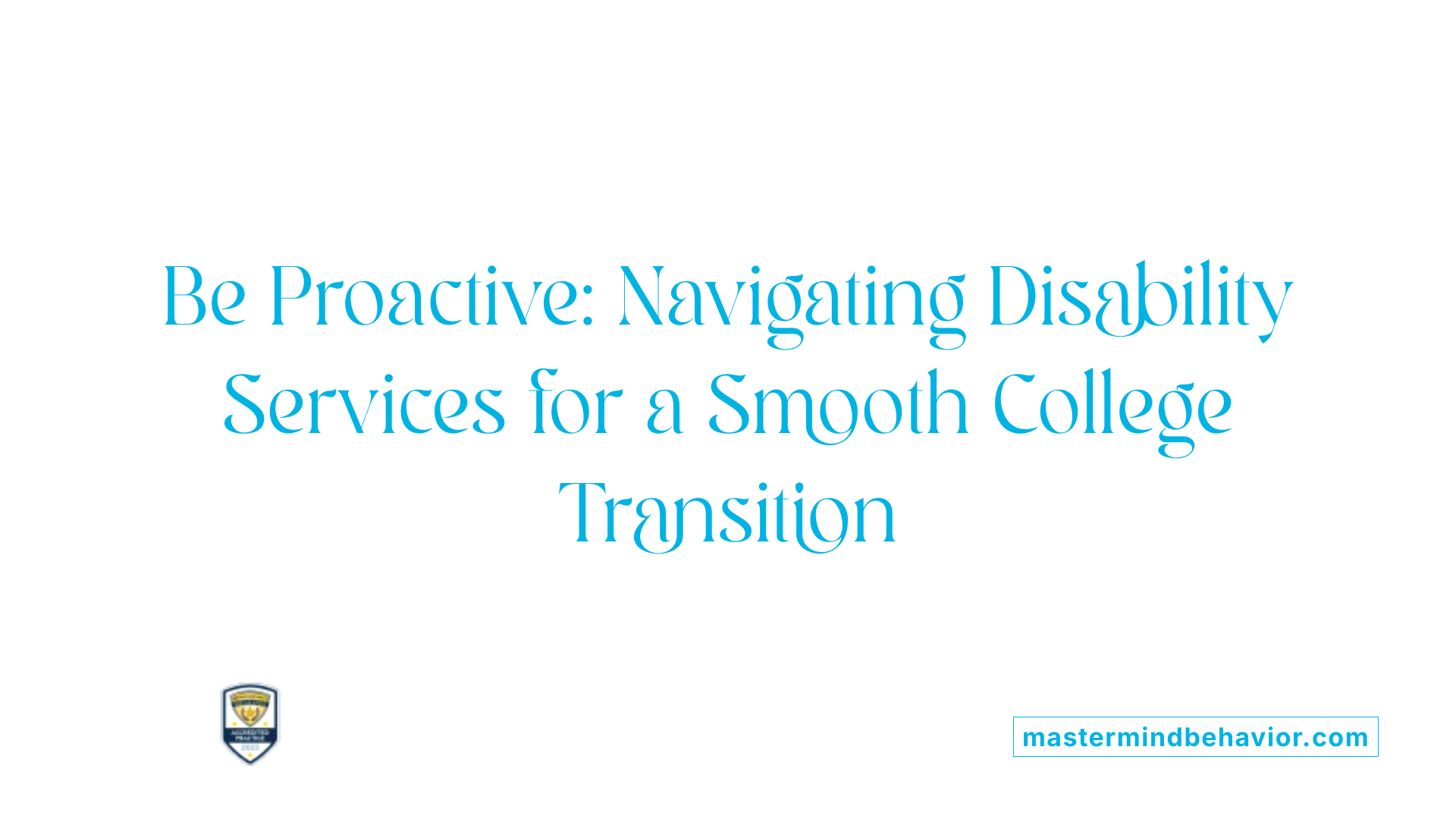
Why is disclosing autism and providing documentation important?
Disclosing an autism diagnosis to a college's disability services office is a personal but often crucial step for students. This disclosure, accompanied by appropriate documentation, ensures eligibility for accommodations designed to address individual needs. It enables students to access supports like extended test time, note-taking assistance, and quiet testing environments.
How to engage effectively with disability offices to obtain accommodations?
Early and proactive engagement with disability offices facilitates a smoother transition. Upon disclosing, students can collaborate with staff to tailor accommodations specific to their academic and social needs. Providing comprehensive documentation helps streamline this process. Students are encouraged to ask detailed questions about available services, eligibility criteria, and how to coordinate accommodations throughout their coursework.
What are the benefits of early disclosure and support planning?
Starting conversations before or at the beginning of college helps prevent delays in receiving accommodations. Early planning reduces anxiety and overwhelm by clarifying support pathways. It also allows students to participate actively in designing their accommodation plans, promoting self-advocacy and independence. Proactive disclosure often results in better academic experiences and higher retention rates among autistic students.
By approaching college disability services with preparedness and openness, students on the autism spectrum can significantly enhance their college experience, building a foundation for academic success and personal growth.
Building Emotional Regulation and Managing Overwhelm in College Life
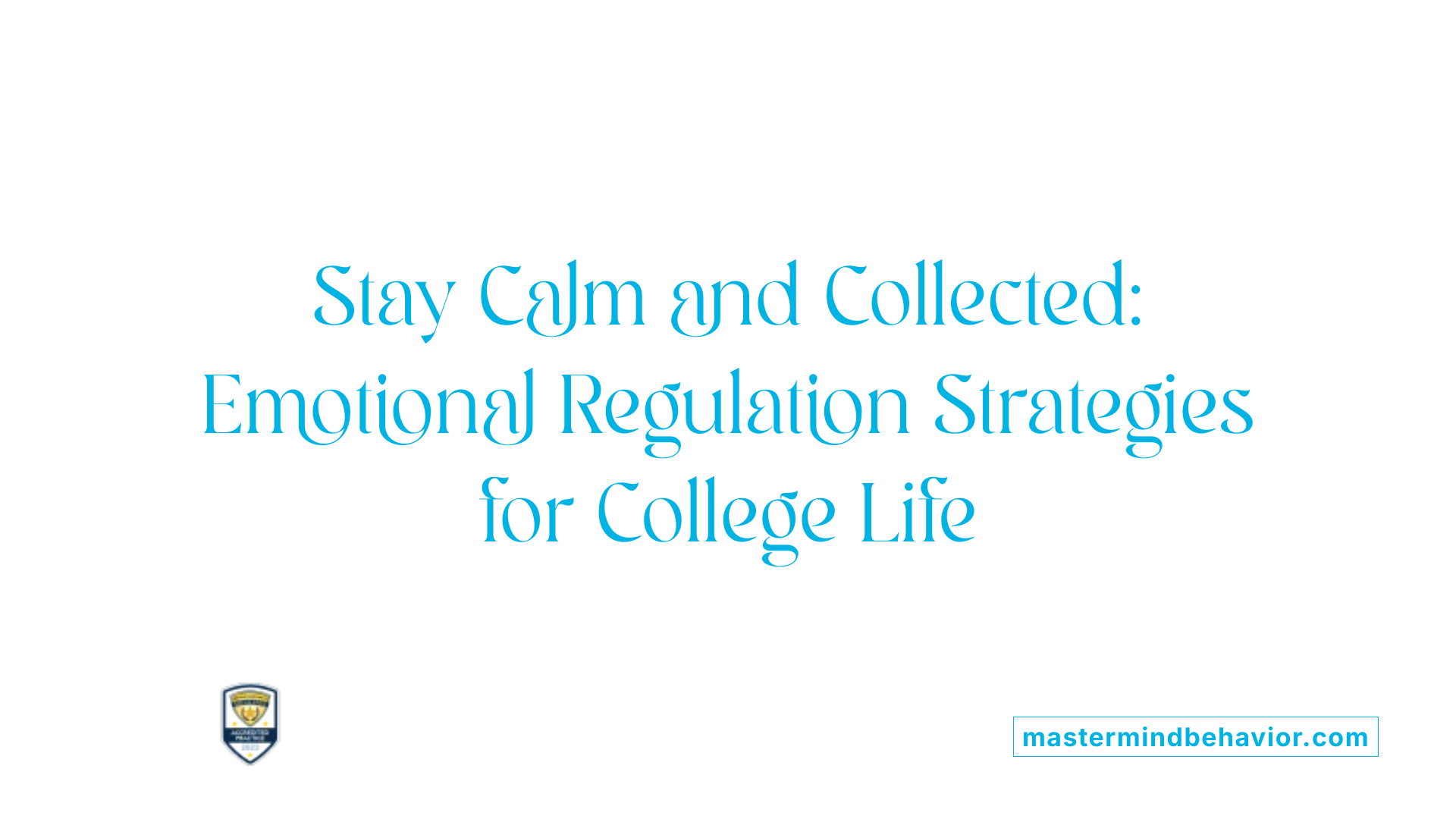
What Emotional Regulation Challenges Do Autistic Students Face in College?
Many autistic students experience significant challenges related to emotional regulation and feelings of overwhelm during their college years. Difficulties in managing strong emotions, sensory sensitivities, and unexpected changes can make it hard to maintain focus and participate fully in academic and social activities. These challenges often stem from deficits in executive functioning and self-regulation, which are common among individuals on the autism spectrum.
How Can Emotional Toolkits Support Autistic Students?
Developing an emotional toolkit is a practical strategy to help students cope with these difficulties. Such toolkits typically include sensory tools (like fidget devices or noise-canceling headphones), meditation techniques, journaling, and mindfulness exercises. These practices support self-awareness and help students manage stress and sensory overload effectively.
Daily use of tools like visual schedules and planners can also reduce feelings of overwhelm by breaking down tasks into manageable steps. Integrating these resources fosters greater independence and emotional control, equipping students to handle both academic pressures and social demands.
Why Is Emotional Regulation Crucial for College Success?
Effective emotional regulation directly impacts a student's retention and academic success. Overwhelm and emotional dysregulation can lead to decreased motivation, missed deadlines, social withdrawal, and even dropping out. Programs such as STEPS focus on improving self-regulation and self-determination skills because better emotional control correlates with improved college adjustment and long-term outcomes.
Support services that proactively address mental health, provide accommodations, and teach coping strategies are essential. When students feel equipped to handle emotional challenges, they are more likely to thrive in the demanding environment of higher education, enhancing both their academic performance and overall well-being.
Promoting Executive Functioning to Support Independence
Teaching initiation, planning, organization, and self-monitoring skills
Executive functioning skills involve the ability to initiate tasks, plan and organize activities, and self-monitor progress. For teens with autism, these skills can be particularly challenging but are essential for independent living and success in college. Instruction in these areas helps students break down complex tasks into manageable steps and maintain focus despite distractions.
Importance of executive functioning for independent living
Poor executive functioning affects time management, organization, and the ability to maintain routines—abilities crucial for thriving in college environments where prior supports may no longer be present. Developing these skills fosters not only academic success but also everyday independence, including managing transportation, finances, and self-care.
Use of assistive technology like recording pens
Assistive technologies, such as recording pens, can aid students in capturing lectures and instructions, allowing them to review material at their own pace. These tools support organization and help compensate for difficulties with note-taking and memory, thereby improving comprehension and self-advocacy in academic settings.
Practical Independent Living Skills Vital for College Success
Self-care, Transportation Planning, and Financial Management
Successfully managing college life involves foundational independent living skills such as self-care, planning transportation, and handling finances. For teens with autism, mastering daily hygiene, meal preparation, and medication management equips them for health and well-being in an independent setting. Transportation skills, like navigating public transit or coordinating rideshares, enable reliable access to classes and social activities. Financial management encompasses budgeting for expenses, understanding banking, and paying bills to foster autonomy and reduce stress.
Self-management Strategies
Self-management is crucial for sustaining independence in college. This includes learning to initiate tasks, plan and organize work, and perform self-checks to ensure quality and completion. Utilizing organizational tools such as planners, visual schedules, alarm clocks, and flow charts can help manage daily routines and prevent overwhelm. The development of an emotional toolkit—incorporating sensory tools, meditation, journaling, and mindfulness—further supports emotional regulation, a challenge commonly faced by autistic students.
Preparation for Dormitory and Campus Living Challenges
Adjusting to dormitory and campus life demands social and practical skills. Students need strategies to cope with sensory sensitivities and emotional regulation difficulties that often arise in busy residential environments. Transition programs and bridge programs can facilitate acclimation by providing structured support for social integration and independent living. Engaging in peer-interest activities and summer camps aligned with personal interests can bolster social development beyond formal skill groups, aiding in creating meaningful connections and a supportive campus experience.
Choosing the Right College Environment for Autistic Students
Assessing Class Sizes and Academic Demands
When selecting a college, it's important for autistic students and their families to consider class size carefully. Smaller classes often provide a more supportive and manageable learning environment, facilitating better access to professors and tailored assistance.
Additionally, the academic rigor and workload should align with the student's executive functioning capabilities. Understanding course expectations, deadlines, and the level of independent work required can guide the best fit.
Evaluating Support Services, Diversity, and Inclusion Policies
Comprehensive support services are crucial for autistic students. Key offerings include disability offices that provide accommodations, mental health resources, and programs specifically designed to support autism spectrum disorders.
Prospective students should also inquire about the campus culture regarding diversity and inclusion. Institutions that emphasize welcoming environments and have active policies to support neurodiversity contribute positively to student well-being.
During college visits, asking detailed questions about accessibility, peer groups, and inclusion initiatives helps ensure the college matches the student's needs.
Benefits of Community College and Flexible Programs for Transition
Starting at a community college or enrolling in flexible programs can ease the transition to independent college life. These options often feature smaller campuses, adaptable schedules, and increased individualized attention.
Such environments allow students to gradually develop self-advocacy, organizational skills, and independence while accessing support services with reduced pressure.
Community colleges frequently offer bridge and transition programs tailored to autistic students, promoting social integration and academic success.
| Aspect | Considerations | Benefits for Autistic Students |
|---|---|---|
| Class Size | Smaller, manageable groups | Personalized attention, reduced overwhelm |
| Academic Demands | Course load, deadlines, independent work | Matches executive function abilities |
| Support Services | Disability office, mental health, autism-specific programs | Tailored accommodations and resources |
| Diversity and Inclusion | Campus culture, policies, peer support | Inclusive environment supports wellbeing |
| Community College and Flexibility | Flexible schedules, smaller campuses, transition programs | Gradual independence and social integration |
Personalized College Planning and Advocacy Support
What is the role of educational counselors and independent advocates?
Educational counselors and independent advocates are essential in guiding autistic students through the complexities of college planning. They help evaluate the student's unique needs, strengths, and challenges to identify suitable college options. These professionals also assist in understanding available support services, navigating disclosure decisions, and preparing documentation needed for accommodations. By offering personalized advice, they empower students to make informed decisions about their educational futures.
How is support tailored for students with special needs?
Tailored support is critical for ensuring that college environments match the specific requirements of autistic students. Counselors and advocates focus on aspects such as class sizes, availability of support programs, and the campus culture regarding diversity and inclusion. They can recommend programs like the University of Alabama's UA-ACTS or California State University's College Link, which provide specialized academic and behavioral supports. This personalization improves the likelihood of positive college adjustment and independence.
Why is engaging families and schools important in the planning process?
Transition planning benefits greatly from the collaboration between families, schools, and support professionals. Engaging these stakeholders fosters a comprehensive understanding of the student’s executive functioning challenges and helps coordinate consistent strategies. Families provide valuable insights into the student’s preferences and history, while schools contribute knowledge of educational progress and services. This teamwork ensures a smoother transition and better preparation for postsecondary success.
Overview of Evidence-Based Transition Support Programs: The STEPS Model
What is the STEPS program and what are its goals?
The STEPS program is an evidence-based transition support curriculum specifically designed for emerging adults with autism spectrum disorder (ASD). Its primary aim is to enhance students' self-determination and emotion regulation, crucial skills that contribute to successful adjustment in postsecondary education and independent living.
Developed through comprehensive participatory processes, including focus groups with students, parents, and educators, STEPS offers tailored resources to address the unique challenges faced by autistic students moving from secondary school to college.
How does STEPS focus on improving self-regulation and self-determination?
STEPS emphasizes self-regulation (SR) and self-determination (SD) because these skills support better routines, inhibitory control, motivation, goal-directed behavior, and emotional management in college environments. Individuals with ASD often face difficulties in executive functioning and emotion regulation, which can interfere with their daily functioning and college success.
By improving SR and SD, the STEPS program aims to provide students with strategies to manage their emotions and advocate for themselves effectively, boosting their confidence and independence in navigating college life.
What is the structure of the STEPS program for different student groups?
STEPS consists of two levels targeting different stages in education:
Step 1: Focused on secondary school students preparing for college, it involves close collaboration with counselors, parents, school staff, and the student. This level includes counseling sessions and immersion experiences at postsecondary institutions, helping students build transition readiness.
Step 2: Designed for college students or recent high school graduates, this level incorporates online learning modules, community outings for practical social skills, and individual counseling to reinforce social integration and increase independence.
Overall, STEPS provides a structured and research-driven approach to facilitate smooth transitions and ongoing success for students with ASD at crucial educational junctures.
Implementation and Impact of the STEPS Program
Active stakeholder collaboration and immersive experiences in Step 1
Step 1 of the STEPS program focuses on students in secondary school who are planning to transition to college. This phase emphasizes active collaboration with a variety of stakeholders, including counselors, parents, school personnel, and the students themselves. Through counseling sessions and immersion experiences at postsecondary institutions, students gain firsthand exposure to college environments. This comprehensive involvement helps students build self-awareness and prepares them for the challenges ahead.
Online modules and social practice in Step 2
Step 2 targets students already enrolled in college or those who have recently graduated from high school. It offers online modules that cover important skills for success, including self-regulation and self-determination. Complementing these modules, the program incorporates community outings that provide opportunities for social practice and real-world experience. Individual counseling in this phase focuses on enhancing social integration and fostering independence to support students as they navigate college life.
Outcomes including increased college adjustment and transition readiness
Preliminary data from randomized controlled trials demonstrate the STEPS program's effectiveness. Students in Step 1 showed significant improvements in transition readiness scores, with positive effects sustained after the intervention. Postsecondary students in Step 2 exhibited increased college adjustment, although some regression occurred after program completion, overall outcomes remained favorable.
Parents also reported notable improvements in their children's readiness for transition and college adjustment, reflecting large effect sizes indicating substantial impact. The program maintained high fidelity of implementation at over 90%, with low attrition rates near 88-89%, underscoring the practicality and acceptability of STEPS. These findings highlight STEPS as an evidence-based approach that effectively supports teens with autism in preparing for and succeeding in college.
Research Evidence Supporting the STEPS Program
Randomized Controlled Trial Results
The STEPS program has undergone rigorous evaluation through a randomized controlled trial (RCT) that demonstrated its acceptability and feasibility for students with autism spectrum disorder (ASD). The trial reported high fidelity of implementation, with over 90% adherence to the program protocol, and maintained low attrition rates of approximately 88-89%. These results indicate the program’s practicality in real-world educational settings.
High Implementation Fidelity and Participant Satisfaction
High implementation fidelity ensures that the core components of STEPS are delivered as intended, which supports consistent outcomes. Participants, including both students and their parents, expressed high satisfaction with the program. Many rated it as helpful and recommended it to others, highlighting the program's positive reception among its consumers.
Impact on Transition Readiness and College Adjustment with Effect Sizes
For secondary school students, STEPS significantly enhanced transition readiness scores which were sustained after the intervention ended, demonstrating durable benefits. Postsecondary students showed marked improvements in college adjustment scores; although some regression emerged post-program completion, overall outcomes remained positive. Importantly, the program yielded substantial effect sizes (d > 1.2) in both transition readiness and college adjustment metrics, reflecting a strong impact on participants’ preparedness and success.
Notably, the program’s benefits varied depending on ASD severity and behavioral challenges. Students with higher ASD severity experienced steeper declines in adjustment following program completion, underscoring the necessity of additional tailored support for this subgroup. These findings reinforce STEPS as an empirically based and effective curriculum designed to foster self-determination and emotion regulation, critical factors that help autistic students navigate the complexities of postsecondary education and independent living.
Addressing Individual Differences and Challenges Within Transition Programs
Influence of ASD severity and behavioral challenges on outcomes
Transition programs for autistic students recognize that individuals vary widely in their strengths and challenges. Research indicates that students with higher severity of ASD symptoms and associated behavioral issues may experience steeper declines in college adjustment after program completion. This finding highlights that severity and co-occurring difficulties critically influence how well a student benefits from a given support program.
Need for additional supports for certain subgroups
Because of these disparities, some students require more tailored or intensive support to sustain gains in transition readiness and college success. Additional interventions might include ongoing mental health services, more focused executive functioning coaching, or enhanced social skills supports. Recognizing this need helps educators and counselors allocate resources more effectively, ensuring no student falls behind after leaving structured programs.
Customization and iterative refinement of programs
Effective transition programs, like STEPS, are developed through participatory and iterative processes that incorporate feedback from students, parents, and educators. This consumer-centered design allows continuous refinement, tailoring curriculum and supports to diverse needs. High fidelity implementation alongside ongoing evaluation ensures the program remains relevant and impactful across different student profiles.
By addressing individual differences and customizing supports, transition programs can better equip autistic students for independent living and academic success in college settings.
Complementary Supports: Social Skills, Peer Engagement, and Bridge Programs
Limitations of Social Skills Groups
Social skills groups have been a popular support strategy for autistic students, but these programs often face challenges in helping skills generalize to real-world settings. Many students struggle to apply what they learn within the group to everyday social environments, such as college classrooms or dormitories. This limited transfer highlights the need for alternative or supplemental supports that better facilitate practical social engagement.
Benefits of Peer-Interest Activities and Summer Camps
Engaging autistic teens in peer-interest activities can foster more natural and meaningful social development. When students share common interests, they’re more likely to connect authentically and feel motivated to participate socially. Similarly, summer camps aligned with a student’s interests offer immersive experiences that encourage social interaction in relaxed, supportive environments. These activities help build friendships and social confidence outside the structured setting of social skills groups.
Bridge Programs Aiding Dorm Living and Academic Adjustment
Bridge programs serve as a vital resource in supporting autistic students as they transition to college life, especially regarding dorm living and academic demands. Such programs often provide targeted training on essential skills like managing daily routines, emotional regulation, and navigating the unique challenges of independent living. By offering hands-on experiences and tailored support, bridge programs help students acclimate successfully to the social and academic environment of college.
Incorporating these complementary supports ensures a more holistic approach to transition planning, addressing social integration and life skills critical for college success. For example, combining peer-interest engagement with bridge program participation can empower students to develop both social competence and independence, reducing overwhelm and enhancing their overall college experience.
National College Support Programs for Students with Autism
University-Based Programs Supporting Autistic Students
Several universities across the U.S. offer specialized support programs designed to help students with autism spectrum disorder (ASD) successfully transition into and thrive in college environments. These programs provide a range of academic, social, and independent living supports tailored to the unique needs of autistic students.
Examples of Notable Programs
- University of Alabama - Autism Spectrum Disorders College Transition and Support Program (UA-ACTS): Offers comprehensive academic and behavioral support aimed at easing the transition and promoting student success.
- Arkansas State University - EduCare: Focuses on students pursuing online degrees with autism, emphasizing mentorship and essential skills development.
- University of Delaware - Spectrum Scholars: Provides coaching, peer mentoring, career development, and more, funded by grants to ensure these services come at no extra cost to students.
- California State University, East Bay - College Link Program: Concentrates on helping students leverage their individual strengths for academic achievement and social integration.
- Nova Southeastern University - Access Plus: Offers academic, residential, and vocational support, though this program comes with a cost of approximately $8,000 per semester.
Diverse Supports Offered
These programs typically include services such as:
- Personalized academic coaching and tutoring
- Structured peer mentoring for social engagement
- Career development and planning resources
- Assistance with daily living skills and independent living
- Regular meetings with support navigators or coordinators
Such comprehensive support addresses various challenges faced by students on the spectrum, including executive functioning difficulties, emotional regulation, and social integration.
Cost and Accessibility Considerations
While many programs like Spectrum Scholars at the University of Delaware provide services free of charge thanks to grant funding, others, such as Nova Southeastern University’s Access Plus, involve substantial tuition fees or program charges. Prospective students and their families should inquire about funding options, scholarships, and program costs during college visits or consultations with educational counselors.
Furthermore, several programs emphasize inclusivity and diversity, ensuring that students' varied needs are met through accessible campus resources and proactive engagement.
This array of nationally available programs underscores a growing commitment among higher education institutions to support autistic students' academic and personal success.
Understanding Applied Behavior Analysis (ABA) Therapy and Its Relevance
What is applied behavior analysis (ABA) therapy?
Applied Behavior Analysis (ABA) therapy is a science-based, individualized approach that uses principles of learning and behavioral science to encourage positive behaviors and decrease harmful or disruptive ones. It involves analyzing what happens before and after a behavior to understand and shape it. ABA employs structured techniques like Discrete Trial Training (DTT), which breaks skills into small parts for focused teaching; Pivotal Response Treatment (PRT), which emphasizes motivation and social skills to improve broad behavior areas; and Natural Environment Teaching (NET), where learning occurs through real-life activities and play.
The therapy is customized to fit each individual's needs and can be delivered in various settings such as home, school, or community environments. A Board Certified Behavior Analyst (BCBA) typically oversees the treatment plan, while trained therapists implement daily sessions. The main goal is to support development in communication, socialization, independent living, and other critical skills for people with autism spectrum disorder (ASD).
How does ABA therapy benefit individuals with autism?
ABA benefits individuals with autism by teaching essential skills tailored to their strengths and developmental levels. Through consistent positive reinforcement and tailored interventions, ABA helps improve communication, social interaction, and the ability to perform daily living tasks independently. Early and intensive ABA treatment has shown to enhance attention, language, and reduce behaviors that could interfere with learning and social participation.
The individualized nature of ABA allows therapists to work on specific goals, such as initiating conversations or managing transitions between activities. This personalized focus supports greater independence and the ability to engage more fully in school, community, and family life.
Who provides ABA therapy and what qualifications do they need?
ABA therapy is provided by qualified professionals including Board Certified Behavior Analysts (BCBAs), behavior therapists, and registered behavior technicians (RBTs). BCBAs have advanced training and certification to design individualized treatment programs and supervise the therapy. Behavior technicians and therapists typically receive specialized training in ABA methods and execute the plans under supervision.
Ethical practice is crucial in ABA delivery, including thorough progress monitoring and maintaining safety standards. Families should verify the credentials of providers and ensure the therapy aligns well with their child’s unique needs.
What are common methods used in ABA therapy?
ABA uses several recognized methods, including:
- Discrete Trial Training (DTT): Skills are broken into small, teachable steps with clear instructions and immediate feedback.
- Natural Environment Teaching (NET): Learning happens in everyday settings through play and natural interaction.
- Pivotal Response Treatment (PRT): Targets motivation and initiations to create widespread improvements.
- Token Economy Systems: Tokens are earned for positive behavior, later exchanged for rewards.
- Peer-Mediated Interventions: Peers are trained to support social skill development, promoting generalization of learning.
These strategies are adapted based on ongoing assessments, focusing on reinforcing desired behaviors and reducing barriers to learning.
How is the effectiveness of ABA therapy measured?
ABA effectiveness is tracked through continuous data collection and behavior monitoring. Standardized tools like the Vineland Adaptive Behavior Scales and Verbal Behavior Milestones Assessment help quantify progress in social and adaptive skills. Therapists record improvements relative to personalized goals—observing increases in communication, social interaction, and daily living abilities.
Regular feedback from caregivers and the client ensures the therapy remains on course and modifies where necessary. Research supports ABA's positive impact on individuals with autism, often verified through statistical analyses comparing pre- and post-treatment results to demonstrate meaningful change.
Empowering Futures Through Preparation and Support
Successfully preparing teens with autism for college life relies on early, comprehensive transition planning, targeted skill development, and access to specialized evidence-based programs such as STEPS. Coupled with supportive college environments, self-advocacy, and executive functioning strategies, these approaches foster independence and personal growth. Integration of therapies like ABA provides foundational skills essential for navigating academic and social challenges. Collectively, these resources empower autistic students to thrive in higher education and beyond, promoting lifelong success and autonomy.
References
- Going to College With Autism
- Development of a College Transition and Support Program ...
- Improving Transition to Adulthood for Students with Autism
- Autism in College: 10 Tips on How to Prepare
- College Programs
- Evaluating the effectiveness of two models of applied behavior ...
- The effectiveness of applied behavior analysis program ...
- How to Measure ABA Therapy's Effectiveness
- Applied Behavior Analysis (ABA)
- What to Consider When Looking for a Qualified ABA Provider


